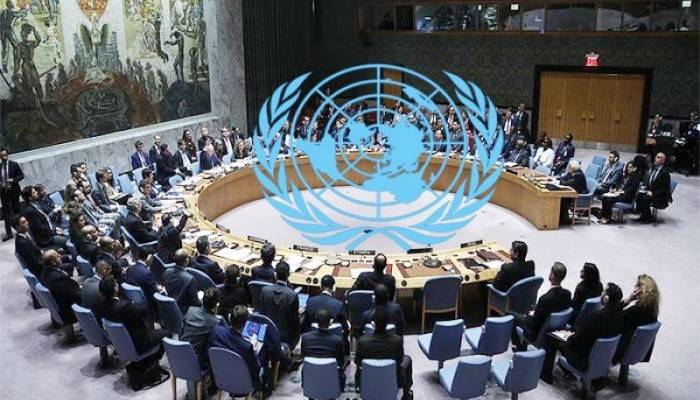Noting India’s views on the issue of illicit transfer of small arms are well-known, Bhattacharyya said the country considers that the primary responsibility for addressing this problem lies with the Member States. …reports Asian Lite News
India has called upon the international community to unequivocally condemn those states, which use advanced technologies like drones for cross-border supply of illicit weapons to terrorist groups in violation of the sovereignty of other member states.
“The increase in volume and the quality of the small arms acquired by terrorist organizations reminds us time and again that they cannot exist without the sponsorship or support of States. It is also well-known that some States are using advanced technologies like drones for cross-border supply of illicit weapons to terrorist groups in violation of the sovereignty of other Member States. This aspect needs to be unequivocally condemned,” MEA Secretary (CPV & OIA) Sanjay Bhattacharyya said at open debate on ‘Impact of Diversion and Trafficking of Arms for Peace and Security’ in the UNSC on Monday.
“The impact of continued flow of small arms and light weapons to terrorists and terrorist groups: These weapons become more sinister and lethal in the hands of terrorists, who deliberately and indiscriminately use them to target innocent civilians, including women and children,” he added.

“The threat posed by the illicit transfer and illegal diversion of small arms to international peace and security is a matter of concern to the entire international community. It has a cross-cutting negative impact on development, security, humanitarian and socio-economic aspects,” Bhattacharya added.
“The fact that the Council members have discussed this complex and multidimensional problem for three consecutive months, formally and informally, reflects the critical nature of the issue and the need for urgency to address it,” he stated.
Noting India’s views on the issue of illicit transfer of small arms are well-known, Bhattacharyya said the country considers that the primary responsibility for addressing this problem lies with the Member States.
In this regard, India supports the redoubling of efforts at the national and global level to strengthen the implementation of the UN Program of Action and the International Tracing Instrument, including through effective national legislative measures and enforcement, export controls, information sharing and capacity building, he added.
Highlighting three key aspects of illicit transfer of small arms, India’s Secretary (CPV & OIA) called out, the first aspect to be the impact of continued flow of small arms and light weapons to terrorists and terrorist groups.
“These weapons become more sinister and lethal in the hands of terrorists, who deliberately and indiscriminately use them to target innocent civilians, including women and children,” he informed.
“The increase in volume and the quality of the small arms acquired by terrorist organizations reminds us time and again that they cannot exist without the sponsorship or support of States,” Bhattacharya said.
“We also call for greater focus on the Terror-Crime nexus, in particular, the thriving illicit network for procurement and transfer of small arms and financing for such procurement and logistical activities. This Council and the international community should do more to prevent and disrupt such networks,” he added.
“Second, the need for effective implementation of Council-mandated arms embargoes: It is an established fact that the flow of illicit arms and weapons to non-State actors and terrorist groups drives and sustains conflicts,” he argued.
“Third, the impact of illicit flows on the safety of UN peacekeepers: The steady and illicit supply of small arms to the warring parties in situations of armed conflict seriously impairs the safety of UN peacekeepers deployed in these areas,” India’s Secretary (CPV & OIA) maintained.
He said it is important for the UNSC to address the danger posed by such illicit transfers to the safety and security of peacekeepers by giving due attention to this issue during the consideration of peacekeeping mandates.
Bhattacharyya noted that India has actively contributed to the multilateral framework to address the problem of illicit transfer of small arms.

“We were privileged to chair the Group of Governmental Experts in 2002-2003, whose recommendations led to the Open-ended Working Group to negotiate the International Tracing Instrument (ITI). India believes that the full implementation of the ITI is necessary for tackling the illicit trade in small arms and light weapons,” he stated further.
“At a national level, India has a robust legislative and administrative mechanism to combat and eradicate the menace of illicit small arms, the details of which can be found in our national reports submitted regularly to the UN Office for Disarmament Affairs,” the MEA Secretary (CPV & OIA) added.
“India has been submitting its national reports to the UN Register of Conventional Arms regularly. India also maintains strict export controls over all munitions and related items, including small arms. India is also a member of the Wassenaar Arrangement,” he argued further.
“India believes that international cooperation and assistance, including capacity building, should be pursued in parallel for full implementation of UN Programme of Action to Prevent, Combat and Eradicate the Illicit Trade in Small Arms and Light Weapons in all Its aspects and the ITI,” Bhattacharyya told the UNSC.
He reaffirmed that India remains fully committed to implementing its international obligations pertaining to the prevention, combating and eradication of the illicit trade in small arms.

Leave a Reply